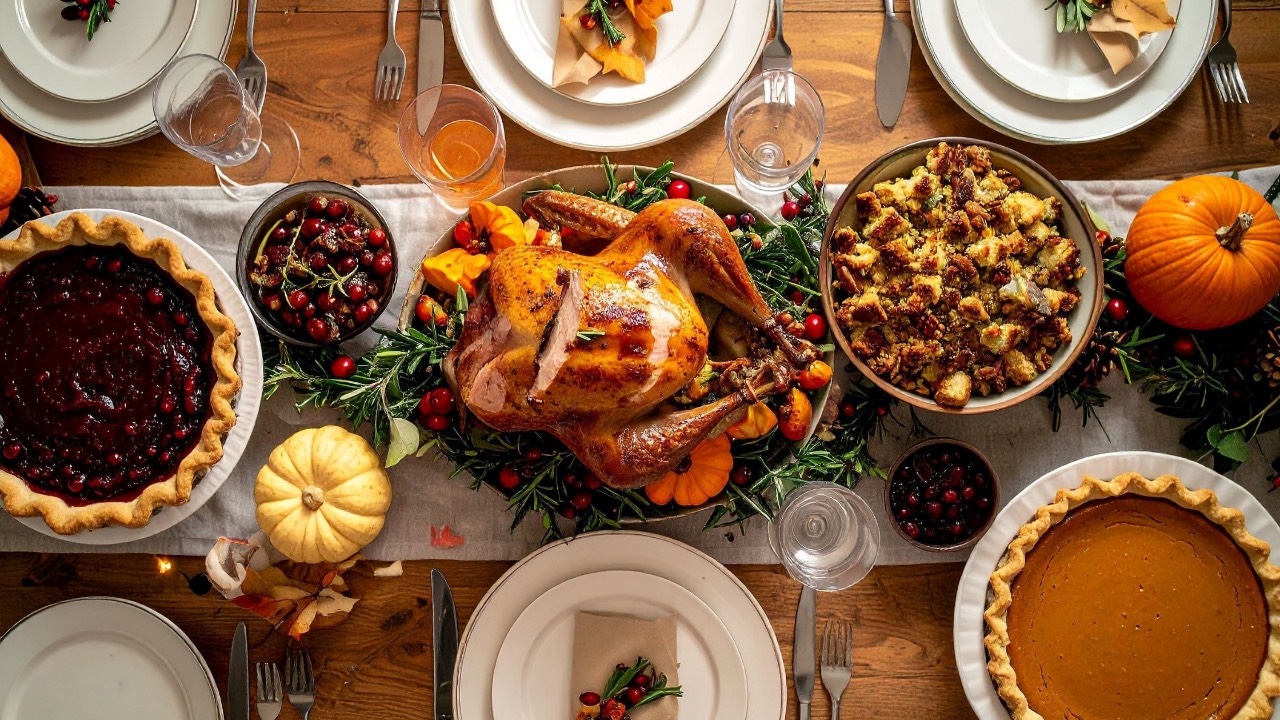
Intuitive Eating and the Nervous System: A Steady Approach to Thanksgiving (or any big holiday meal)
Nov 25, 2025Thanksgiving has a way of activating the parts of you that learned to stay hyper-aware of food, appetite, and how others might interpret what you’re eating. The yummy dishes, the noise of family dynamics, the pressure to “eat normally,” and the old patterns that surface around celebration meals -- these things are all heightened on big food event kind of days. It’s a day where your nervous systemmight be even more overstimulated than usual.
If you’re doing work around binge eating recovery, intuitive eating, or healing your relationship with your body, this holiday can feel layered. A steadier approach starts with understanding what your system needs and offering it the kind of support that actually works.
Tools for a More Regulated Thanksgiving
1. Keep your meals predictable earlier in the day.
When people “save up” for a big meal, what they’re really doing is creating a long window without steady input. And a long window without steady input doesn’t set you up for control; it sets you up for instability. The nervous system doesn’t know you’re doing math in your head or trying to be strategic. It only registers the absence of energy. That absence reads as a kind of scarcity, and scarcity shifts the body into protection mode.
Steady input does the opposite. When you eat at regular intervals, the system stays anchored. Blood sugar stays more level, which means hunger signals arrive in a way you can actually respond to. The brain doesn’t have to deal with sudden drops that trigger urgency. Cortisol stays lower because your body isn’t interpreting the day as unpredictable. And because the rhythm is intact, you don’t walk into the holiday meal already activated, already depleted, or already negotiating with yourself.
This is why eating your regular breakfast and lunch matters more than any attempt to “save room.” The steadiness tells your body that food is available, which settles the food seeking behavior that tends to show up later. Your pace stays closer to your own instead of merging with the energy of the room. The whole day becomes easier to move through because your system isn’t waiting for a famine you didn’t intend to create.
.
2. Regulate your pace.
Holidays can pull you into an orbit of everyone and everything around you. The room fills with overlapping conversations, emotional history, clutter clacking of dishes, relatives talking about bodies. It's like a broken refrigerator hum you have to get used to. The nervous system is wired to match the environment, so the pace of the table often becomes the pace of your eating without any conscious decision on your part.
A small internal check-in can shift your experience. Offer yourself a moment where you come back into your body. Release your jaw, let your shoulders fall, loosen your stomach muscles, take a deeper breath (I always breath more shallow in overstimulation). These micro-adjustments interrupt the pull into the room’s energy and bring you back to ground.
3. Allow your meal to be conscious and enjoyable.
Meals feel different when they give your system something solid to work with and something that actually feels good to eat. Your body notices both.
Sit down to a plate of protein, carbohydrates, fats, fiber, and at least one thing on your plate that feels like YUM (ie. not the version of you who’s just trying to impress the clean eating influencers).
The nervous system relaxes in a way it doesn’t when you’re picking around your food or pretending mashed potatoes are dangerous. AND you are still allowed to include vegetables, proteins, and other macronutrients that help you feel full, satiated, and grounded.
When meals lean too far in one direction — the overly careful plate or the “screw it, I’ll deal with this tomorrow” plate — your system can de-stabilize. You can finish eating and still feel unfinished. People love to diagnose that moment as a lack of discipline, but usually it’s just your body trying to finish the meal you didn’t actually let yourself have, to escape the imbalance.
When you let yourself build a plate that has both steadiness and some real pleasure in it, everything gets easier. It has a clear beginning and a clear end, and you can move on to the rest of the day without negotiations about tomorrow or next Monday.
4. Work with fullness instead of bracing against it.
Fullness gets a lot louder on holidays, mostly because there’s so much history tied to it. If you grew up dieting, or bouncing between overeating and tightening the reins again, or treating fullness like a sign you’d “gone too far,” your body still remembers that. The sensation doesn’t just land as stomach pressure. It comes with an entire backstory.
What makes fullness feel overwhelming isn’t the food itself. It’s the way the body reacts to it. When your stomach starts to stretch and you immediately pull your belly in, or hold your breath, or lift your shoulders like you’re bracing for something, the sensation amplifies. The nervous system reads your posture as a cue that something is wrong, and suddenly what could have been a normal human experience becomes something tight and uncomfortable.
Softening the body shifts this a bit. Let your belly expand without trying to “fix” it, let your shoulders fall back, let your breath move — these small changes tell your system there’s no emergency here. Lean into it. It can just be a sensation minus the story. It’s just fullness, and it passes.
5. Let the day contain more than food decisions.
It’s easy for the whole holiday to slip into a tunnel where the food becomes the main thing you’re thinking about. Even thinking about these tools is still thinking about food, in some ways. And then we're just...still focused on this one "problem."
Find a point of focus that has nothing to do with any of this.
Find something in your real life — the cousin who makes you laugh, the rhythm of the house, a kid running by, the smell of something cooking, stepping outside for a minute and remembering you have a whole nervous system that responds to more than food.
These moments are the actual substance of the day. They turn your attention back toward what makes holidays worth having, what you are actually fighting for.
A Grounded Way to Close the Day
Thanksgiving isn’t an assessment of how regulated you are or how successfully you’ve integrated intuitive eating. It’s one day inside a long process of learning your own patterns, understanding your nervous system, and supporting yourself in ways that hold up over time.
The real work happens across ordinary days. A holiday simply gives you a slightly louder version of what’s already there.
Let these days help you notice more.
And if you enjoyed this blog post and would like to hear it talked through with more detail, check out my podcast episode, linked here!

